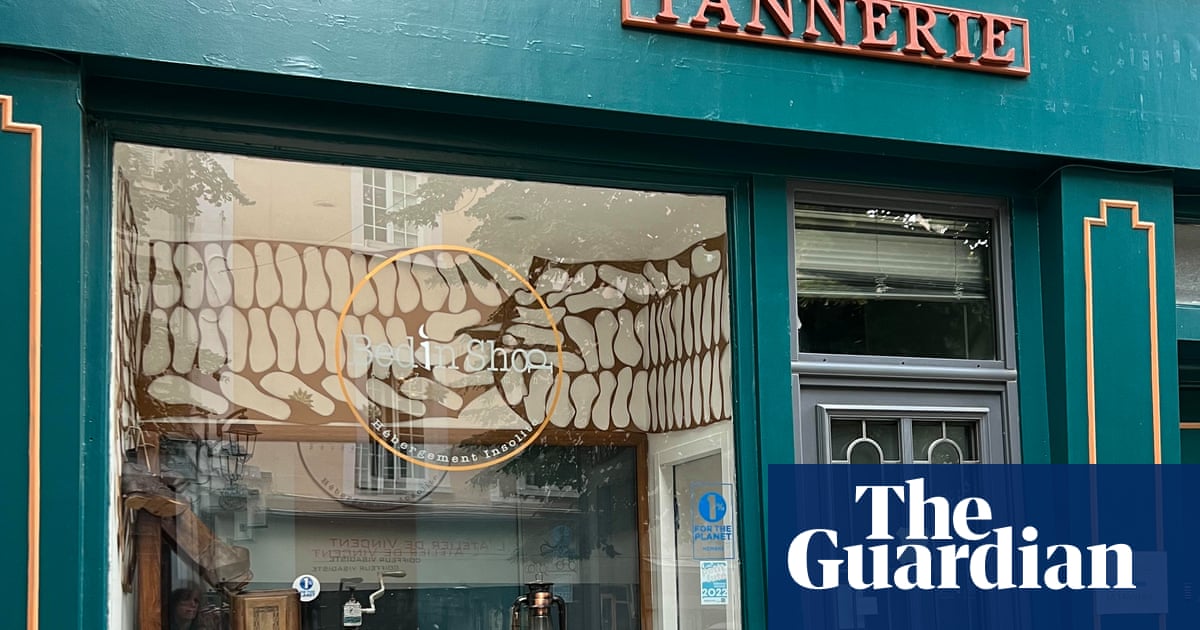
Dear old Doctor Who has been in the doldrums. The pesky pandemic caused production delays, panicked rewrites and truncated series. Ratings have slumped, buzz has been badly lacking, and critical kickings have been administered. But all is not lost for the BBC franchise. Apart from the imminent return of showrunner Russell T Davies, there’s another ray of light – and it comes in the form of a transgender-led podcast.
Written by Juno Dawson, Doctor Who: Redacted was launched alongside the Easter TV special, Legend of the Sea Devils, and has been described by the producer/director Ella Watts as “very gay, very trans”, and sitting “to the left” of the main show. The 10-part BBC Sounds audio drama follows three best mates who make “the Blue Box Files”, a paranormal conspiracy podcast about a certain police box popping up throughout history. Their tongue-in-cheek theorising suddenly gets all too real when they’re sucked into an action-packed alien adventure of their own.
The friends are university dropouts, who now live in different UK cities but stay connected via their hobby podcast. The leader of the gang (and the drama) is a trans woman, Cleo, who works as a theatre usher, lives on a south London estate and is saving up for surgery. She’s played by transgender activist Charlie Craggs, a scene-stealer in her first ever acting role, who describes her casting as “a huge step for the trans community. I’m so honoured to be part of something so sacred to so many”.
Juno Dawson always had Craggs in mind to play her protagonist. “She’s such a force,” says Dawson. “The label “trans activist” can be a club with which to beat trans people. It’s a dehumanising term, but Charlie uses her voice so cleverly – with humour and honesty. When it came to casting, I said to Ella: ‘Look, we can either audition Charlie Craggs or find a trans actor and tell her to play it like Charlie Craggs.’ There were some nerves at the BBC about hiring someone untrained but I’m so glad we stuck to our guns.”
Founder of the podcast-within-a-podcast is devoted “boxspotter” and resident believer Abby (Vigil’s Lois Chimimba), who is bisexual and a full-time carer for her sick mother in Glasgow. The lineup is completed by sceptical Shawna (Grange Hill’s Holly Quin-Ankrah), an out-and-proud lesbian studying computing at her local college in Sheffield.
Interestingly, this regional diversity is what came first for Dawson. “Being from Bradford myself, I adore hearing regional accents on the BBC,” she says. “I love that Doctor Who has lived its life in Cardiff, Sheffield and Liverpool in recent years. That regionality isn’t there enough in BBC drama, which is often kind of placeless. So, before I even thought about their gender or sexual identity, it was important to me that they were from different parts of the UK. Shawna was specified in the script as being a black or mixed-race woman from the north, whereas Abby was always going to be from Glasgow, which is one of my favourite cities.”
“The three loser-teers”, as they self-deprecatingly style themselves, discover that everyone who has ever met the Doctor is disappearing, their very existence being forgotten. They’re being “redacted from reality”. Is there an allegorical significance here? “Somewhat,” says Dawson. “The notion of being silenced or erased feels part of the online language nowadays. But, I would say to the listener: it’s Doctor Who, don’t read too much into it. It’s more about a threat hanging over the world.”
Ironically, the Blue Box Files is so unsuccessful that our heroines are the last names on the hitlist, making Cleo, Abby and Shawna the world’s only hope. They must race against time to uncover the truth and avert “end-of-the-world-type danger”.
As the drama unfolds, they are joined by familiar faces – OK, voices – most notably, the 13th Doctor herself (Jodie Whittaker). Also reprising their Doctor Who spin-off roles are Rani Chandra (Anjli Mohindra) of The Sarah Jane Adventures, and UNIT’s Kate Stewart (Jemma Redgrave), Petronella Osgood (Ingrid Oliver) and Madame Vastra (Doon Mackichan).
As well as the Time Lord’s allies, certain well-known monsters make an appearance too. “It was such a thrill to play with these beloved characters,” says Dawson. “It’s like borrowing someone else’s toy box. As long as you give the toys back in mint condition, you can just go mad. I was in the next room as Jodie was recording my dialogue, and admit I cried. I never cry! I never thought in a million years I’d get to see the Doctor reading dialogue I’d written for them.”
But the podcast is not just peppered with cameos, it also nods to Who storylines past and present. Tardis companions Martha, Ryan, Graham and Yaz get name-checked. So do previous TV plot details such as the dodgy dieting company Adipose Industries and that time an entire hospital got teleported to the moon by talking space rhinos.
Not that Dawson wanted the podcast to be all about pleasing the purists. “I didn’t want it to be too heavy on fan service,” she says. “The reason Doctor Who’s been running for nearly 60 years is because it’s always kept the door open to new fans. Especially with each new Doctor, there’s an invitation to come in and join the party. But there are Easter eggs and little callbacks. The girls have a podcast investigating the legend of the Doctor, so it makes sense they’d be hunting for clues. At the same time, it tells its own story. You don’t need to have seen a lot of Doctor Who to understand Redacted.”
The high-stakes narrative is cleverly interwoven with the trio’s personal lives. Abby might have a controlling boyfriend (“the man-baby”) lurking in the background but she and Shawna have a sweet will-they-won’t-they romantic subplot. Despite class clown Cleo insisting she’s “only here for the sass, babe”, we learn that her mother kicked her out when she started to transition in her teens, but is now seriously ill and trying to reconcile. “It’s hard not to feel for Cleo’s character,” Craggs has said. “You’d have to be some sort of sociopath not to empathise with what she’s going through with her mum.”
Dawson agrees: “I wanted to highlight that Cleo’s had a difficult old life but, like Charlie, has developed a thick skin to hide her pain. That’s something that Russell T Davies did particularly well. If you make the humans’ lives feel real and layered, then, somehow, the sci-fi feels more real as well. There’s something delicious about seeing a Yeti on the tube or a Dalek going over Tower Bridge. It’s the extraordinary mixed with the ordinary. I wanted the characters to feel like your nextdoor neighbours.”
She scripted four of the 10 episodes herself, with the rest credited to new writers – again, with a strong emphasis on diversity and regionality. With Redacted, bestselling author Dawson becomes the Doctor Who franchise’s first openly trans lead writer.
For a lifelong Whovian who calls the show her “first love”, that’s a big deal. “When I watched Bonnie Langford [who played companion Mel] as a kid, I decided I wanted to be her,” she says. “And then Sophie Aldred came along as Ace, an even stronger character who killed Daleks with a baseball bat. Long before I knew I was a girl, I knew I was Mel and Ace. The show had a huge impact on me, so it’s a privilege to put my own little flag on the landscape.”
Whittaker has enthused about working with Dawson and Craggs, saying “their energy is ace”. Redacted is, indeed, irresistibly sparky. Characters are powered by protein shakes and oat milk lattes. Episodes run to a pacy 20 minutes. The dark conspiracy plot is leavened by a script that zings with Drag Race lingo and gags about alien penises in jars. Harry Styles is hailed as “an honorary lesbian”. “Live, laugh, love” culture and boomers who leave voicemails are roundly ridiculed. It’s like a sci-fi remix of Mae Martin’s Feel Good. Or It’s A Sin with aliens also saying “La!”.
As such, it’s going down a storm. “I was nervous because the fandom are so passionate,” says Dawson. “I’ve been that judgmental fan myself. But people have been incredibly positive. That goes for the queer and trans community too. A lot of the messages that I’m getting online are from people saying, ‘I feel seen’.”
Doctor Who has long flirted with gay subtext. Since its 2005 reboot, queer characters include Captain Jack Harkness (John Barrowman) and Madame Vastra’s wife, Jenny Flint, but it wasn’t until five years ago that the franchise introduced its first full-time LGBTQ+ companion, Bill Potts (played by Pearl Mackie). She was swiftly followed by Whittaker as the Doctor’s first female incarnation – recently revealing her feelings for companion Yaz (Mandip Gill).
The show received an Ally award at the 2017 PinkNews Awards for its “long-standing LGBT inclusiveness”. Now that Redacted’s cast and crew of diverse queer women are saving the universe, it’s another step forward for representation.
“Doctor Who has always appealed to LGBTQ+ people,” says Dawson. “There’s something so enduring about the idea that, if you’re living a slightly humdrum life, this person in a blue box can whisk you away for an adventure in time and space. Many of the Doctor’s sidekicks have been downtrodden or marginalised, even if they weren’t outwardly queer. So to take that subtext and make it text, that means a lot. We don’t need to make it a metaphor any more. We can have three queer women front and centre.”












